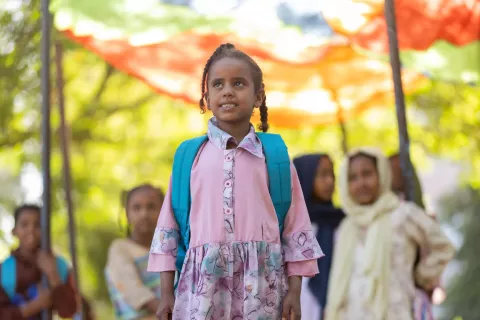Five things you need to know about children and armed conflict
UNICEF and partners provide protection for children who were, or still are in situations of armed conflict around the world, advocating on their behalf and engaging with all parties to ensure their rights are upheld.

- Available in:
- English
- العربية
Children, not soldiers
The thousands of children recruited and used in armed conflicts across the globe are often referred to as ‘child soldiers. These children suffer extensive forms of exploitation and abuse, including sexual violence, that are not fully captured by that term. Warring parties use children not only as combatants, but as scouts, cooks, porters, guards, messengers and more. A more correct term is Children Associated with Armed Forces and Armed Groups. These children should be considered primarily as victims of grave child rights violations.
Children become part of an armed force or group for various reasons. Some are abducted, threatened, coerced or manipulated by armed actors. Others are driven by poverty, compelled to generate income for their families. Still others associate themselves for survival or to protect their communities. No matter their involvement, the recruitment and use
Six types of grave violations
Children affected by armed conflict must at all times be protected. Armed forces and armed groups are required by international humanitarian law to take measures to protect civilians, including children, who are particularly vulnerable during times of armed conflict. However, from widespread killing, maiming, abduction and sexual violence to recruitment into and use by armed forces and armed groups and attacks on schools and hospitals, as well as essential water facilities – children living in conflict zones around the world continue to come under attack on a shocking scale.
To better monitor, prevent, and end these attacks, the United Nations Security Council has identified and condemned six grave violations against children in times of war: Killing and maiming of children; recruitment or use of children in armed forces and armed groups; attacks on schools or hospitals; rape or other grave sexual violence; abduction of children; and denial of humanitarian access for children.
Girls too
While grave violations affect boys and girls differently, girls too are severely affected in armed conflicts. Whereas most children recruited and used are boys, virtually all sexual violence is perpetrated against girls. Due to cultural norms and stigmatization, sexual violence remains vastly underreported.
Of the 317 grave violations verified in Sudan in 2020, nearly half targeted were girls.
In numbers
Globally, between 2005 and 2020, more than 93,000 children were verified as recruited into and used by parties to conflict, although the actual number of cases is believed to be much higher.
In 2020, the United Nations verified a total of 26,425 violations against children in conflict situations across the globe. This corresponds to 72 violations occurring every single day or three violations every hour. It also marked the seventh year in a row with at least 20,000 verified violations. These are only the cases that can be verified through the United Nations-led Monitoring and Reporting Mechanism (MRM), established in 2005 to systematically document grave violations against children in conflict zones. The true figures are undoubtedly much higher.
Of those grave violations against children, 317 were verified in Sudan in 2020.
How UNICEF in Sudan is helping
Across Sudan, UNICEF and partners are continuing to provide care and protection for children like Younis who were or still are in situations of armed conflict, advocating on their behalf and engaging with all parties to conflict to ensure their rights are upheld.
In addition to providing emergency and longer-term assistance to children, UNICEF and its partners have also trained governmental officials and parties to conflict on child protection, and raised awareness with the Government, communities and families on the risks facing children in armed conflict.
Violence breeds violence. Breaking vicious cycles of armed conflict is crucial for providing the building blocks for the development of societies and a peaceful country. Children have a right to be protected at all times, in particular during armed conflict.



